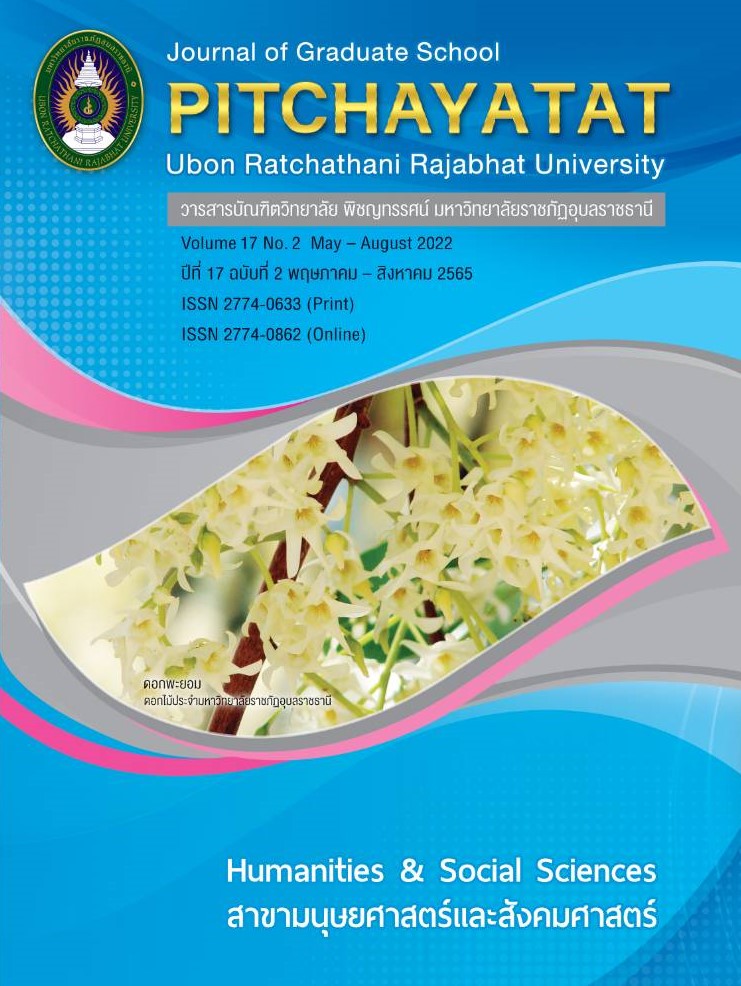สภาพ ความต้องการจำเป็น และแนวทางพัฒนาทักษะการจัดการเรียนรู้ยุคชีวิตวิถีใหม่ของครู สังกัดสำนักงานเขตพื้นที่การศึกษาประถมศึกษานครพนม เขต 2
คำสำคัญ:
สภาพปัจจุบัน , สภาพที่พึงประสงค์ , ยุคชีวิตวิถีใหม่ , ทักษะการจัดการเรียนรู้บทคัดย่อ
การวิจัยนี้มีวัตถุประสงค์เพื่อ 1) ศึกษาสภาพปัจจุบันและสภาพที่พึงประสงค์ 2) ประเมินความต้องการจำเป็น 3) พัฒนาแนวทางพัฒนาทักษะการจัดการเรียนรู้ในยุคชีวิตวิถีใหม่ของครู สังกัดสำนักงานเขตพื้นที่การศึกษาประถมศึกษานครพนม เขต 2 ตัวอย่าง ได้แก่ ครูและผู้บริหารสถานศึกษา จำนวน 345 คน กำหนดขนาดตัวอย่างโดยใช้เกณฑ์ร้อยละ ได้มาโดยการสุ่มแบบหลายขั้นตอน เครื่องมือที่ใช้ในการวิจัย มีจำนวน 4 ฉบับ คือ 1) แบบสอบถามสภาพปัจจุบันของทักษะการจัดการเรียนรู้ในยุคชีวิตวิถีใหม่ของครู 2) แบบสอบถามสภาพที่พึงประสงค์ของทักษะการจัดการเรียนรู้ในยุคชีวิตวิถีใหม่ของครู 3) แบบสัมภาษณ์แบบมีโครงสร้าง และ 4) แบบประเมินความเหมาะสมและความเป็นไปได้ของแนวทางทักษะการจัดการเรียนรู้ในยุคชีวิตวิถีใหม่ของครู สถิติที่ใช้ ได้แก่ ร้อยละ ค่าเฉลี่ย ส่วนเบี่ยงเบนมาตรฐานและค่าดัชนีการจัดลำดับความสำคัญของความต้องการจำเป็นแบบปรับปรุง (PNI modified)
ผลการวิจัยพบว่า
- สภาพปัจจุบันของทักษะการจัดการเรียนรู้ในยุคชีวิตวิถีใหม่ของครู โดยรวมอยู่ในระดับมาก สภาพที่พึงประสงค์ของทักษะการจัดการเรียนรู้ในยุคชีวิตวิถีใหม่ของครู โดยรวมอยู่ในระดับมากที่สุด
- ความต้องการจำเป็นในการพัฒนาการทักษะการจัดการเรียนรู้ในยุคชีวิตวิถีใหม่ของครูที่มีค่าสูงสุด 3 อันดับแรก ได้แก่ ด้านทักษะการใช้เทคโนโลยีสารสนเทศและการด้านทักษะการวัดและประเมินผล และด้านทักษะการจัดกิจกรรมเรียนรู้
- แนวทางพัฒนาทักษะการจัดการเรียนรู้ในยุคชีวิตวิถีใหม่ของครู 1) ด้านทักษะการจัดกิจกรรมการเรียนรู้ ผู้บริหารและสำนักงานเขตพื้นที่การศึกษาควรจัดโครงการอบรมเกี่ยวกับทักษะการสอนในศตวรรษที่ 21 2) ด้านทักษะการใช้เทคโนโลยีสารสนเทศและการสื่อสาร ผู้บริหารควรมีการจัดตั้งวิทยากรของโรงเรียนที่มีความเชี่ยวชาญด้านเทคโนโลยี คอยดูแล สอน ครูท่านอื่น ๆ ในโรงเรียน 3) ด้านทักษะการจัดการชั้นเรียน ผู้บริหารควรส่งเสริมให้ครูจัดทำปฏิทินเวลาในการจัดทำป้ายนิเทศในชั้นเรียน 4) ด้านทักษะการวัดและประเมินผล ผู้บริหารควรส่งเสริมให้ครูทำวิจัยอย่างง่าย เสนอปัญหา แนวทางแก้ไข ผลที่ได้ ไม่เน้นปริมาณเนื้อหา และ 5) ด้านทักษะอาชีพและชีวิต ผู้บริหารหรือสำนักงานเขตพื้นที่การศึกษาควรส่งเสริมสนับสนุนครูให้ทำผลงานทางวิชาการ เพื่อเลื่อนวิทยฐานะและขอรับรางวัลจากหน่วยงานต่าง ๆ ผลการประเมินแนวทางพัฒนาโดยรวมพบว่า มีความเหมาะสม อยู่ในระดับมากที่สุด และมีความเป็นไปได้ อยู่ในระดับมากที่สุด
เอกสารอ้างอิง
กรุงเทพธุรกิจ. สำรวจผลกระทบหลังโควิด-19 จุดเปลี่ยนการศึกษาโลก. (ออนไลน์) 2564 (อ้างเมื่อ 2 พฤษภาคม 2564) จาก http://www.bangkokbiznews.com
ไชยยศ ไพวิทยศิริธรรม และยุวรี ญานปรีชาเศรษฐ. “การเสริมสร้างทักษะชีวิตและการทำงานของนักศึกษาครู,” ศิลปากรศึกษาศาสตร์วิจัย. 13, 1 ( มกราคม-มิถุนายน 2564): 132-143.
ธนาคาร คุ้มภัย และคณะ. “รูปแบบการจัดการเรียนการสอนออนไลน์สาขาช่างอุตสาหกรรมบนความปกติใหม่ ช่วงวิกฤติโควิด–19,” มหาจุฬานาครทรรศน์. 8, 3 (มีนาคม 2564): 1.
บุหงา คงราช. “การพัฒนาแนวทางพัฒนาครูในการจัดการเรียนรู้ที่เน้นผู้เรียนเป็นสำคัญสำหรับสถานศึกษา สังกัดสำนักงานเขตพื้นที่การศึกษาประถมศึกษาศรีสะเกษ เขต 2,” การบริหารและนิเทศการศึกษา มหาวิทยาลัยมหาสารคาม. 8, 1 (มกราคม-เมษายน 2560): 171.
ปณิธิ เจริญรักษ์. แนวทางพัฒนาทักษะการจัดการเรียนรู้ในศตวรรษที่ 21 ของครู โดยผู้บริหารสถานศึกษา สังกัดสำนักงานเขตพื้นที่การศึกษา มัธยมศึกษา เขต 11 สุราษฎร์ธานี. สุราษฎร์ธานี: มหาวิทยาลัยราชภัฏสุราษฎร์ธานี, 2563.
พจนีย์ มั่งคั่ง และกัญภร เอี่ยมพญา. “แนวทางการพัฒนาทักษะการเรียนรูในศตวรรษที่ 21 ของครูโรงเรียนเครือข่ายฝึกประสบการณวิชาชีพครู สังกัดสำนักงานเขตพื้นที่การศึกษาประถมศึกษาฉะเชิงเทรา เขต 1,” มนุษยสังคมปริทัศน์ (มสป.). 22, 1 (มกราคม-มิถุนายน 2563): 116-135.
พนมนคร มีราคา. “ครูต้องมีลักษณะอย่างไรในศตวรรษที่ 21,” ศึกษาศาสตร์ มมร.ศึกษาศาสตร์ มหาวิทยาลัยมหามกุฏราชวิทยาลัย. 5, 2 (กรกฎาคม-ธันวาคม 2560): 25.
พัชราภรณ์ ดวงชื่น. “การบรหิารจัดการศึกษารับความปกติใหม่หลังวิกฤตโควดิ-19,” ศิลปะการจัดการ. 4,3 (กันยายน–ธันวาคม 2563): 789.
ภูมิภควัจธ์ ภูมพงศ์คชศร. “การบริหารจัดการชั้นเรียนเพื่อพัฒนาทักษะการเรียนรู้ในศตวรรษที่ 21,”สหวิทยาการมนุษยศาสตร์และสังคมศาสตร์. 3, 3 (กันยายน-ธันวาคม 2563): 591-600.
มูลนิธิยุวพัฒน์. การศึกษาในยุค Covid-19. (ออนไลน์) 2563 (อ้างเมื่อ 2 พฤษภาคม 2564) จาก https://ejodil.stou.ac.th/Page/restemplate2.aspx
เลขาธิการสภาการศึกษา, สำนักงาน. การพัฒนากลไกขับเคลื่อนระบบการผลิตและพัฒนาครูสมรรถนะสูงสำหรับประเทศไทย 4.0. กรุงเทพฯ: สำนักงานเลขาธิการสภาการศึกษา, 2560.
วิจารณ์ พานิช. ทักษะแห่งศตวรรษที่ 21. (ออนไลน์) 2555 (อ้างเมื่อ 2 พฤษภาคม 2564) จาก sites.google.com/site/ppvilawan21/thaksa-haeng-stwrrs-thi-21
สุริยา ฆ้องเสนาะ. สะเต็มศึกษา. กรุงเทพฯ: สำนักวิชาการ สำนักเลขาธิการสภาผู้แทนราษฎร, 2559.
อริสา นพคุณ, บรรจบ บุญจันทร์ และสุวิมล ตั้งประเสริฐ. “การพัฒนาสมรรถนะครูในสถานศึกษา สังกัดสำนักงานเขตพื้นที่การศึกษานครราชสีมา,” ชุมชนวิจัย. 12, 3 (กันยายน-ธันวาคม 2561): 232-244.
อินทิรา ชูศรีทอง ไชยา ภาวะบุตร และวัฒนา สุวรรณไตรย์. “รูปแบบการพัฒนาครูในการใช้เทคโนโลยีสารสนเทศและการสื่อสารเพื่อจัดการเรียนรู้ในโรงเรียนประถมศึกษา สังกัดสำนักงานศึกษาธิการภาค 11,” ครุศาสตร์ ราชภัฏสกลนคร. 10, 2 (พฤษภาคม-สิงหาคม 2563): 98.
Andarwulan, Trisna et al. “Elementary Teachers' Readiness toward the Online Learning Policy in the New Normal Era during Covid-19,” International Journal of Instruction. 14, 3 (July 2021): 771.
ดาวน์โหลด
เผยแพร่แล้ว
รูปแบบการอ้างอิง
ฉบับ
ประเภทบทความ
สัญญาอนุญาต
ลิขสิทธิ์ (c) 2022 วารสารบัณฑิตวิทยาลัย พิชญทรรศน์ มหาวิทยาลัยราชภัฏอุบลราชธานี

อนุญาตภายใต้เงื่อนไข Creative Commons Attribution-NonCommercial-NoDerivatives 4.0 International License.
บทความทุกเรื่องได้รับการตรวจความถูกต้องทางวิชาการโดยผู้ทรงคุณวุฒิภายนอกอย่างน้อย 3 คน ความคิดเห็นในวารสารพิชญทรรศน์เป็นความคิดเห็นของผู้นิพนธ์มิใช่ความคิดเห็นของผู้จัดทำ จึงมิใช่ความรับผิดชอบของวารสารพิชญทรรศน์ และบทความในวารสารพิชญทรรศน์สงวนสิทธิ์ตามกฎหมายไทย การจะนำไปเผยแพร่ต้องได้รับอนุญาตเป็นลายลักษณ์อักษรจากกองบรรณาธิการ





